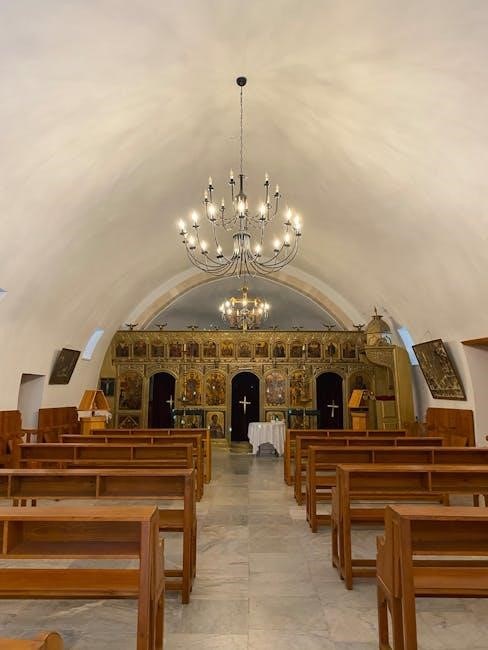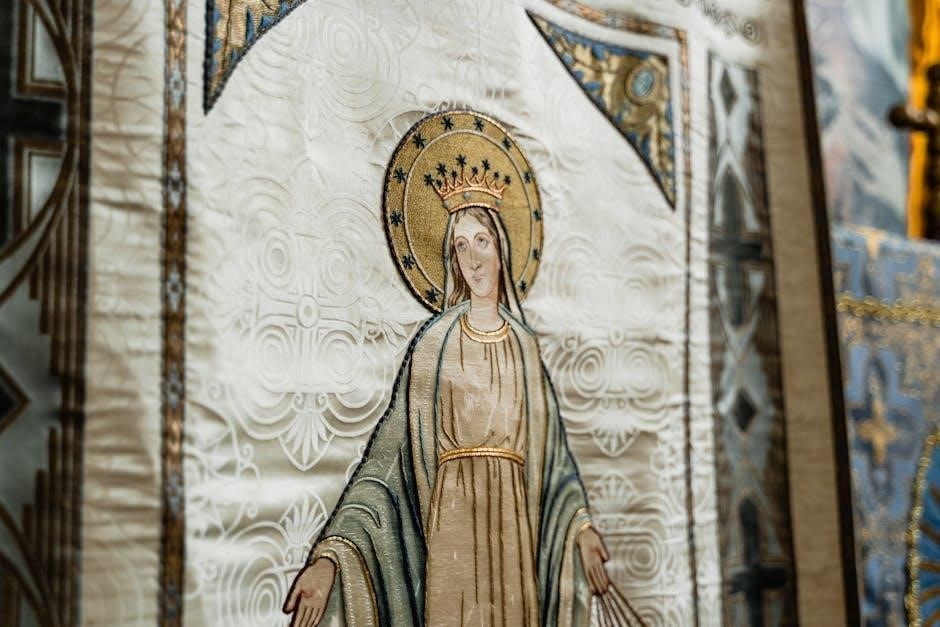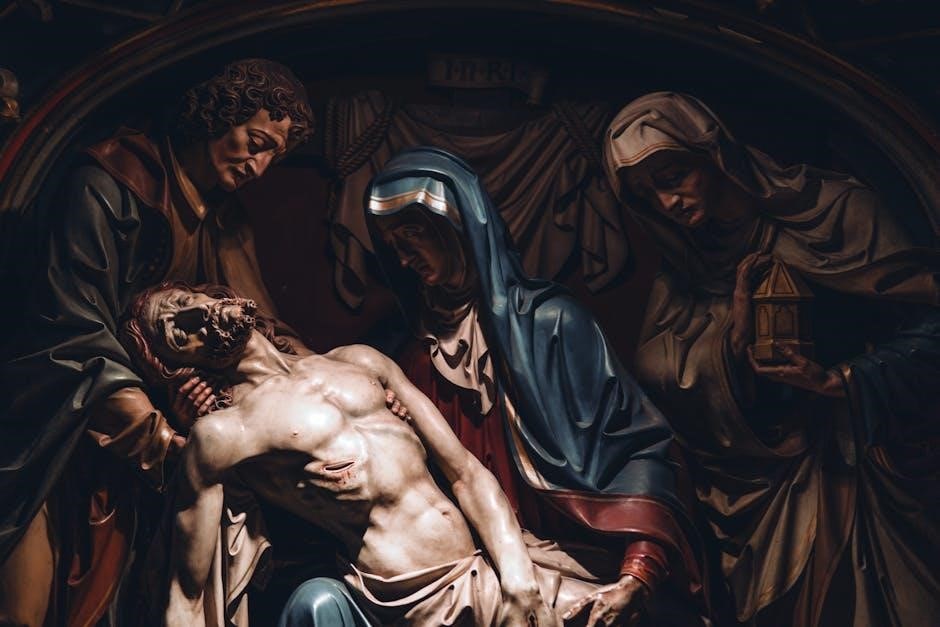Psalm 23, a beloved Psalm of David, holds deep significance in Catholicism, offering comfort and trust in God’s providence․ Its liturgical and devotional use is widespread, with printable PDF resources available for personal reflection and worship․
Overview of Psalm 23 and Its Significance in Catholicism
Psalm 23, attributed to King David, is a profound expression of trust in God’s providence and care․ In Catholicism, it is cherished for its universal themes of divine guidance, comfort, and hope․ The psalm’s vivid imagery, such as the shepherd metaphor, resonates deeply with believers, offering solace in times of uncertainty․ Its significance lies in its ability to inspire trust in God’s plan, even amidst life’s challenges․ The psalm is widely used in Catholic liturgy, devotion, and personal prayer, making it a cornerstone of spiritual reflection․ Its timeless message encourages believers to seek God’s presence in all aspects of life, fostering a deeper relationship with Him․ This beloved psalm remains a powerful source of strength and consolation for Catholics worldwide․
The Role of Psalm 23 in Catholic Liturgy and Devotion
Psalm 23 holds a central place in Catholic liturgy and devotion, often recited or sung during Masses, funerals, and memorial services․ Its comforting words provide solace to the faithful, particularly in times of grief․ As a responsorial psalm, it is frequently used to reflect on God’s mercy and guidance․ In devotional practices, Catholics incorporate Psalm 23 into daily prayers and meditations, using its imagery to deepen their spiritual lives․ Printable PDF resources and guides featuring the psalm are widely available, aiding individuals in personal reflection and communal worship․ Its universal appeal makes it a unifying element in Catholic spirituality, bridging liturgical and personal devotion seamlessly․ This timeless psalm continues to nurture faith and hope among believers, reinforcing trust in God’s providence and care․

Historical and Theological Context of Psalm 23
Psalm 23, attributed to King David, reflects his shepherd experiences, symbolizing God’s guidance and care․ Its theological themes emphasize trust in divine providence and comfort in adversity, resonating deeply in Catholic spirituality․
The Authorship and Historical Background of the Psalm
Psalm 23 is traditionally attributed to King David, a prominent figure in the Hebrew Bible, who began his life as a shepherd․ This experience deeply influenced the imagery of the Psalm, where God is portrayed as a shepherd guiding and protecting His people․ The historical context suggests David wrote this Psalm during a time of personal reflection on his relationship with God, drawing parallels between his role as a shepherd and God’s care for humanity․ The Psalm’s themes of trust, divine provision, and comfort resonate with its audience, making it a cornerstone of Jewish and Christian spirituality․ Its inclusion in Catholic liturgy and devotional practices highlights its enduring relevance and universal appeal․ The shepherd metaphor remains a powerful symbol of God’s faithfulness and love․
Theological Themes: God as Shepherd and Provider
Psalm 23 profoundly explores the theological themes of God as a shepherd and provider, emphasizing trust in His divine care and provision․ The imagery of the shepherd underscores God’s guidance, protection, and comfort, while the metaphor of green pastures and still waters symbolizes spiritual nourishment and peace․ This Psalm highlights God’s faithfulness, reassuring believers of His presence even in times of darkness or uncertainty․ The theme of providence is central, as it reflects God’s abundant care for His people, fulfilling their needs and restoring their souls․ These theological themes resonate deeply in Catholic spirituality, encouraging devotees to trust in God’s plan and seek solace in His unwavering love and provision․ The shepherd metaphor remains a powerful symbol of God’s relationship with humanity, inspiring hope and faith in His eternal care․

Psalm 23 in Catholic Liturgical Practices
Psalm 23 is integral to Catholic liturgy, often used in Mass, funeral services, and devotional prayers; Its comforting words provide solace and trust in God’s care, resonating deeply in worship․
Responsorial Psalms and Their Use in the Mass
Responsorial Psalms, including Psalm 23, are integral to the Catholic Mass, serving as a response to the readings․ They foster active participation and reflection, uniting the congregation in prayer․ The psalm’s comforting imagery, such as “The Lord is my shepherd,” resonates deeply, offering solace and trust in God’s providence․ In the liturgy, the cantor or choir leads the response, while the assembly joins in, creating a harmonious dialogue of faith․ This tradition not only enriches the liturgical experience but also deepens the spiritual connection of the faithful, making Psalm 23 a cherished part of worship․
Psalm 23 in Funeral and Memorial Services
Psalm 23 is often recited or sung during Catholic funeral and memorial services, offering comfort to the grieving․ Its reassuring imagery of God as a shepherd provides hope and solace, emphasizing trust in divine providence․ The psalm’s themes of guidance, rest, and eternal life resonate deeply with mourners, reminding them of God’s presence even in sorrow․ In liturgical contexts, it is frequently chosen as a responsorial psalm, with its familiar verses fostering communal prayer and reflection․ The use of Psalm 23 in these services not only honors the deceased but also strengthens the faith of those gathered, reinforcing the belief in eternal rest and divine mercy․ Its inclusion in funeral rites underscores its enduring role in Catholic tradition and devotion․

Prayer and Meditation with Psalm 23
Psalm 23 is a powerful tool for daily prayer and meditation, fostering trust in God’s guidance and providence․ Its timeless words encourage reflection on divine comfort and faithfulness, offering solace in life’s challenges․ Many Catholics incorporate it into their devotional practices, using printable PDF guides to deepen their spiritual connection and find peace in God’s presence․
Daily Devotional Practices Using Psalm 23
Daily devotional practices with Psalm 23 are a profound way to deepen one’s faith and connection with God․ Many Catholics incorporate this Psalm into their morning or evening prayers, using its comforting words to reflect on divine guidance and provision․ Printable PDF guides are widely available, offering structured reflections and meditations on each verse․ These resources often include prayers, questions for personal reflection, and insights into the theological richness of the Psalm․ By reciting or reading Psalm 23 daily, believers can cultivate a sense of trust in God’s plan and find solace in His presence․ This practice not only strengthens spiritual life but also provides a meaningful way to embrace the Catholic tradition of praying with Scripture․
Meditative Reflections on the Shepherd Metaphor
The shepherd metaphor in Psalm 23 invites believers to reflect on God’s nurturing care and guidance․ Catholics often meditate on verses like “The Lord is my shepherd; there is nothing I shall want” to deepen their trust in divine providence․ This imagery evokes feelings of safety and assurance, reminding believers of God’s faithfulness in times of uncertainty․ Printable PDF guides and devotional resources frequently include reflections on this metaphor, encouraging prayerful contemplation of God’s role as a loving shepherd․ Such meditative practices help Catholics cultivate a sense of dependence on God and find comfort in His presence, making Psalm 23 a cherished part of their spiritual journey and prayer life․

Cultural and Artistic Interpretations of Psalm 23
Psalm 23 has inspired art, music, and literature, with themes of trust in divine care․ It appears in Catholic iconography and designs, enriching cultural expression․

Psalm 23 in Catholic Art and Iconography
Psalm 23 has been a source of inspiration for Catholic artists, depicted in various forms of iconography․ The imagery of the Good Shepherd, guiding believers through green pastures and still waters, is a common motif․ This representation symbolizes God’s care and protection, resonating deeply with the faithful․ The psalm’s themes are often incorporated into stained-glass windows, paintings, and sculptures within churches, creating a visual reminder of divine providence․ Additionally, the shepherd metaphor is frequently used in religious literature and devotional materials, further cementing its place in Catholic artistic tradition․ These visual and literary expressions enhance the spiritual connection to the psalm, making it a cherished part of Catholic cultural heritage․
Modern Applications: Printable PDF Resources and Guides
Printable PDF resources featuring Psalm 23 are widely available, offering Catholics convenient tools for prayer and reflection․ These guides often include the full text of the psalm, accompanied by meditative reflections and prayers․ Many resources are designed for personal devotion, while others are tailored for communal worship or educational purposes․ For example, Responsorial Psalm guides provide structured responses for liturgical use, while funeral and memorial services often incorporate Psalm 23 in downloadable formats․ These PDFs are easily accessible online, making them a popular choice for Catholics seeking to deepen their spiritual connection to the psalm․ Additionally, some resources include artistic illustrations, further enhancing the spiritual experience of engaging with Psalm 23․

Psalm 23 remains a cornerstone of Catholic devotion, offering timeless comfort and trust in God’s providence․ Its universal appeal endures, enriching faith and worship across generations․
The Enduring Relevance of Psalm 23 in Catholic Life
Psalm 23 continues to resonate deeply in Catholic life, offering solace, hope, and trust in God’s providence․ Its vivid imagery of the shepherd metaphor provides emotional and spiritual nourishment, making it a cornerstone of faith․ Widely used in liturgy, funerals, and personal devotion, the Psalm’s versatility endears it to believers across generations․ Its themes of guidance, restoration, and divine presence inspire meditation and reflection, fostering a closer relationship with God․ The availability of PDF resources further enhances its accessibility, allowing Catholics to integrate its message into daily prayer and worship․ This timeless Psalm remains a powerful expression of faith, comforting the afflicted and strengthening the faithful in their journey toward eternal life․

Leave a Reply
You must be logged in to post a comment.